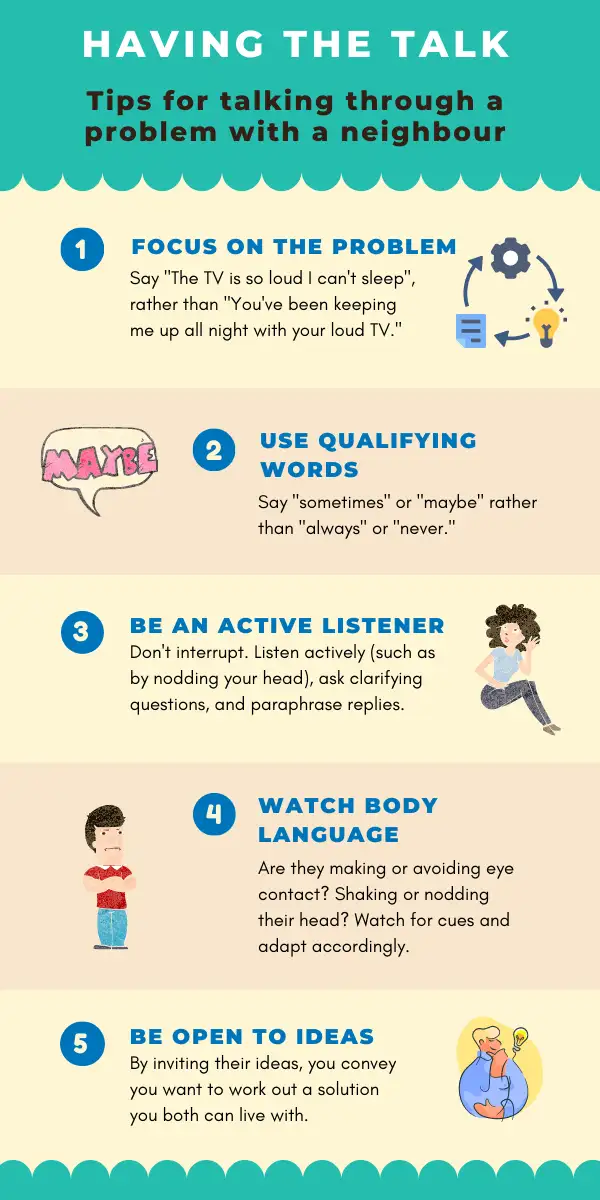“My neighbour regularly smoked in his backyard. Whenever I sat on my deck, or just opened the back windows, I smelled cigarettes. I finally decided to say something. I made notes in advance, which helped me stay calm. My neighbour said he didn't realize the smoke affected me. He committed to smoke only in his front yard (where it doesn’t impact me). I’m glad we talked! I’m able to enjoy my deck and open my windows again.”
– Deana, Coquitlam, BC

Do you need to talk with your neighbour about a problem that’s come up between you? Maybe you’ve been meaning to have that talk but aren’t sure how to bring up the issue. Or maybe you’re worried about approaching your neighbour. Learn tips to help you talk with your neighbour.
What you should know
Your neighbour may be doing something that’s bothering you. But they may not be aware they're disturbing you or how frustrated you are about the issue — whether it’s second-hand smoke, a noise issue, a fence in need of repair, or some other problem. Talking with your neighbour is a good first step and might just resolve the matter quickly.
You live near your neighbour. You see them on a regular basis. As far as you know, neither of you has plans to move any time soon. You don’t want to rock the boat too much, because it’s less stressful (and more peaceful) to live among neighbours who like and respect each other. Having an ongoing relationship with your neighbours is an important consideration when trying to figure out how to deal with a problem that’s come up between you.
Sometimes informal steps don’t fit the situation. You may find your neighbour intimidating, unapproachable, or unavailable. You might prefer writing a letter or contacting your municipality, rather than talking with your neighbour. That’s up to you. We explain other options to deal with a problem with a neighbour. You can start with whatever step best fits your situation.
Steps to having the conversation
Imagine your neighbour’s dog has been barking on and off for several hours. You're drawn to knock on your neighbour’s door and tell them exactly how irritated you are. While letting off some steam may make you feel better in the short term, approaching your neighbour in the moment probably isn’t the best idea.
Instead, give yourself some time to calm down and collect your thoughts. Then let your neighbour know you’d like to speak with them about a problem.
Suggest options for when and where to meet. Try to pick times you think both you and your neighbour will be calm and relaxed. Neither of you will be in the right frame of mind to talk if you’re under stress or time constraints.
Before you meet with your neighbour, prepare what you want to say.
Make notes
Writing down a few key points can help you feel calm, prepared, and confident. In your notes, cover:
What the problem is. Describe the problem. Note any specific incidents and when they happened.
Why the problem is bothering you. Figuring this out will help you explain your perspective to your neighbour.
Your neighbour’s perspective. Put yourself in your neighbour’s shoes to see if you can understand their perspective.
What you and your neighbour have in common. Identify common interests you and your neighbour share.
The solution you want. Try to think of solutions that may work for both of you.
You can use this template to help you prepare.
Gather material in support
If you have any photos, videos, or recordings of the problem, gather them in support of your complaint.
You can also look up local bylaws. Many cities and towns have rules about issues involving neighbours. You can search your municipality’s bylaws to see if any apply to your situation. Save any relevant bylaw so you can show it to your neighbour.
Find a local bylaw
On the website CivicInfo BC, you can search across local government websites province-wide to find local bylaws for your community. In the search box, type in a keyword on point, the word bylaw, and your community name.
For example, to find a fence bylaw for Victoria, you could type fence bylaw victoria.
When it’s time to meet with your neighbour, take your notes and any supporting material with you. Take a few deep breaths as you head to the meeting.
Be friendly and introduce yourself if you haven’t already met. A little bit of humour and small talk can help break the ice. When you’re ready, be calm and respectful. Here’s a sequence you might follow.
1. Calmly explain what the problem is
“I’m not sure if you know this, but Bailey barks much of the day when you’re at work.”
2. Explain how the problem affects you
“I work from home and it’s really hard for me to concentrate. It takes me longer to finish my work and I’m pretty worn out by the end of the day.”
3. Stick to the facts
“Yesterday, Bailey started barking at 9:15 am after you left and didn’t stop until 10:30 am. Then he started again at 11 am and didn’t stop until noon.”
4. Share any evidence you’ve gathered
"Here's a recording I made of Bailey's constant barking. And here's a copy of the noise bylaw that applies."
5. Highlight your common interests
“Our neighbourhood is peaceful and quiet. I sense this is one of the main reasons we both enjoy living here.”
6. Suggest solutions and invite your neighbour’s input
“I’ve tried wearing ear plugs, but they’re not a long-term solution. So I looked online and found some advice about training dogs. Here’s what I found. What do you think?”
7. Discuss a timeline to check-in
“Do you mind if we check in about this in two weeks?”
At the end of the conversation, consider thanking your neighbour for their time, understanding, and willingness to work together to resolve the problem.
Keep your cool
During the conversation, it’s important not to yell, blame, or threaten your neighbour. This can escalate the situation rather than resolve it. If you are too frustrated to continue the conversation, consider telling your neighbour you’d like to continue your meeting another day, or switch to written communication.

Either during or after the conversation with your neighbour, make detailed notes of what each of you said, as well as the date and time you spoke. Also make a note of the outcome and any timelines you agreed on.
After talking with your neighbour, it’s a very good idea to provide them with a written summary of the conversation, including the date and time and what was discussed. You can also set out other information, including:
the outcome (including any agreement reached)
any timelines agreed on
any courses of action each of you agreed to take
a proposal for a date for a follow-up meeting
You can provide your summary by email or letter. It’s best to do so as soon as possible after your meeting. If the issue isn’t resolved, this brief record of the discussion may be helpful down the road if you have to consider other options.
Who can help
If the problem feels like one you need a person to help with, there are options for free or low-cost legal advice.

Access Pro Bono's Free Legal Advice
Volunteer lawyers provide 30 minutes of free legal advice to people with low or modest income.

Access Pro Bono’s Everyone Legal Clinic
Clinicians provide affordable fixed-fee services on a range of everyday legal problems.

Lawyer Referral Service
Helps you connect with a lawyer for a complimentary 15-minute consult to see if you want to hire them.

BC Legal Directory
Search for a lawyer by community or legal issue. From the Canadian Bar Association, BC Branch.
